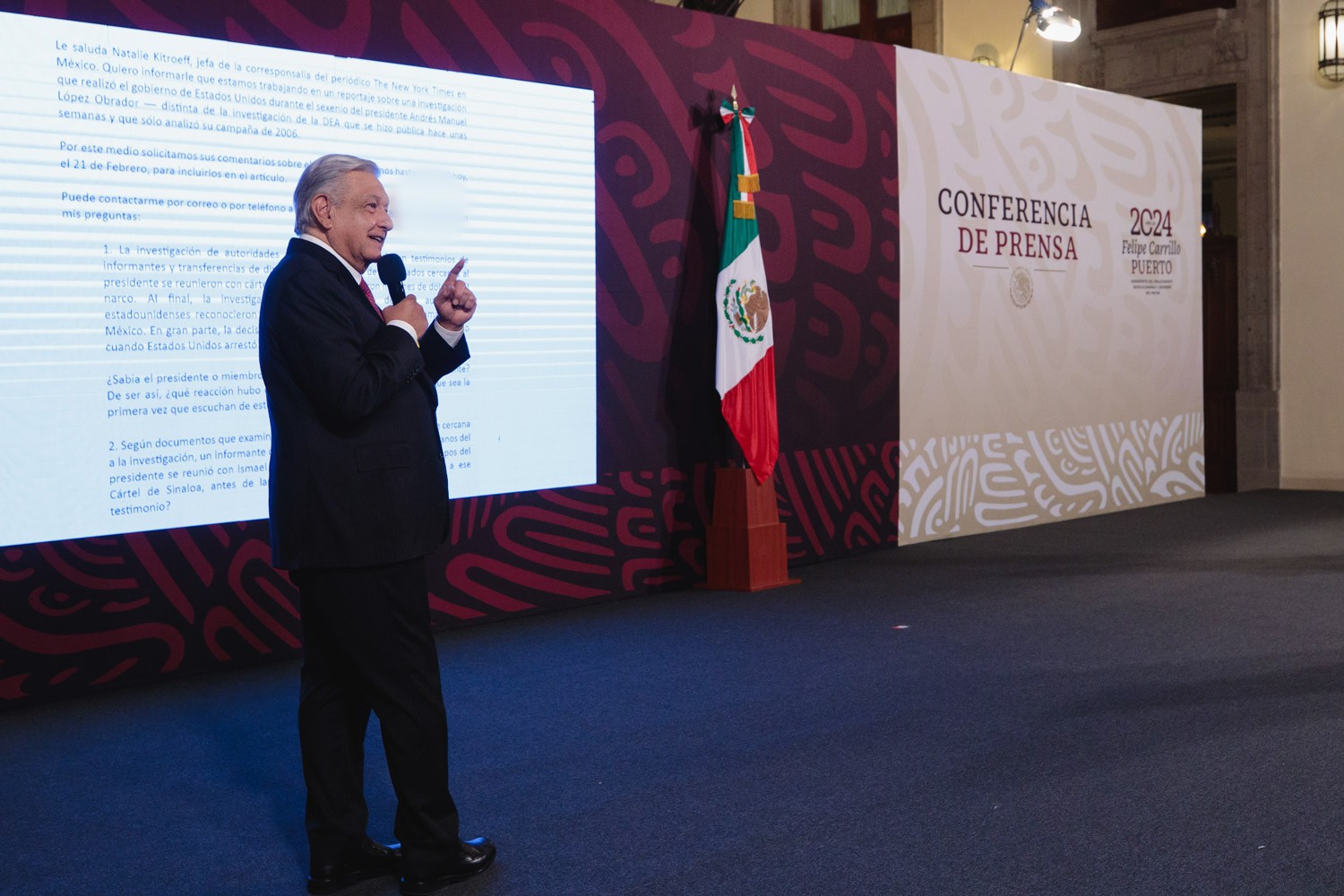Andrés Manuel Lopez Obrador is president of one of the biggest and most populated countries in the region of the Americas and the entire planet. After almost five years in power, he continues to capture the preferences and favorable opinions of Mexicans. An unusual thing, if we consider that his predecessors with similar results ended their mandates with low levels of acceptance and popularity.
An older man, we could say, he has fought to attain the position in the Presidential Palace of the Zócalo in Mexico City since he was very young.
A pertinent question that should be asked to López Obrador would be regarding the challenge of governing a country that is divided into federated states, each with broad autonomy. Does the president of Mexico truly have control over the entire nation?
A laboratory of cocaine and other drugs was recently seized in the north of the country, with a value of approximately 700 billion dollars. Authorities didn't find anyone on the premises. Just the laboratory and all its paraphernalia.
López Obrador swears he is a man of integrity and very far from acts beyond all probity. However, his children (he has three of a first marriage) have been accused of illicit activities in receiving huge amounts of money from narcotraffic cartels. So has his brother, who is linked to the president through his participation in MORENA, the party that propelled Andrés Manuel (as those close to him call him) to the presidential seat.
Interesting that López Obrador approached the mother of drug lord Chapo Guzmán, a long-time mafia member linked to the most dangerous and bloody drug cartels in the country, to greet her and offer his condolences after Chapo Guzmán was caught and imprisoned in the United States. Mexicans, strangely, saw López Obrador’s act as one of empathy and compassion. The international press, however, pointed it out as a sign of closeness, which is unhealthy between a president and the leaders of the cartels and criminal mafias, to say the least.
Coming himself from the interior of the country (the state of Tabasco, located in the south between the states of Oaxaca, Campeche and Chiapas), López Obrador was a child of rural roots. This explains why he boasts of speaking, as he says, with a rather humble country accent in his mornings. Those “mornings” consist of nothing more than a daily morning press conference, which have become daily events for a rather naive and sleepy press that appear only to listen to López Obrador’s frequent long diatribes. On occasion, a brave and enlightened journalist appears and asks the right questions. He, the president, then answers evasively, accusing the conservatives (as they call the opposition) of all the evils, and justifying his lack of resolution in the face of the multiple challenges facing the Mexican nation.
The government’s star program, called the 4th Transformation, is a bit mysterious. Opaque because it is diffuse, since its scope has never been specified, much less its motives or its projections that provide no clear breakdown of the route to the transformation the government claims it will bring. López Obrador usually frames this “transformation” as the continuation of other transformative events in Mexican history: the Mexican War of Independence (1810-1821), the Reform War (1858-1861), and the Revolution of 1910. Or with the Porfiriato — the government/dictatorship of Porfirio Díaz — or with the changes proffered by Benito Juárez with whom he shares some physical resemblance. He says he is proud of his heritage and the indigenous phenotype they both share.
The large numbers López Obrador can cite tell a very partial story. Note that during his mandate he created just over a million new jobs. Minimal thing in a country of 126 million inhabitants. The economy has grown just 3.5%, the same average as his predecessors and pre-pandemic data.
One of López Obrador's biggest setbacks was his handling of the pandemic. His opponents and much of the general public believe that his management was not the most appropriate. However, the restrictions in Mexico, and other measures generated in the heat of the situation by the PAHO (Pan American Health Organization) and the WHO, seem not to have been as draconian as in other countries. López Obrador is still accused of mismanagement, however, along with his health minister.
López Obrador is also accused of concentrating power, including with excessive support for the mayor of Mexico City, Claudia Sheinbaum. He wants to see her in the presidential chair after his soon-to-end term, and who seems to be ahead in all the polls with the ruling MORENA party. However, she has suffered not one but several setbacks in her management of Mexico City with its 30 million inhabitants, particularly in relation to infrastructure issues. Several works have turned out to be a fiasco at the time of their execution, such as the collapse of bridges and trains in the middle of the city.
The most serious of all, however, is that in the year 2023, as reported by the Argentinian media INFOBAE, at least 30,523 Mexicans died by violent death (i.e., by murder). Security in Mexico is an area of great importance in Obrador's mandate. With a score of just 7.57, according to InfoBae, it is the third most dangerous country in the world. And on this, the president simply remains silent, does not respond, and gives no explanation for such a situation.
In this way, many among his detractors call him “narco-amlo,” while others cheer to the claim of a “4th Transformation.” Meanwhile, López Obrador has fashioned himself as a culture minister, traveling through towns and municipalities to inaugurate works to rescue and restore the country's cultural and architectural heritage. Giving away churches, squares and public buildings in towns, many of them prey to mafias. He, Andrés Manuel, is dedicated to exalting Mexicanness, while ignoring what is truly urgent.
As he is now on the verge of concluding his mandate, several works with which he began his government — and of which he was proud because of the benefits he said they would bring to the Mexican people — remain to be seen. Like the Mayan Train. It’s an interesting piece of infrastructure, crossing states in the south of the country, establishing a channel between the Pacific Ocean and the Atlantic or Caribbean Sea. However, the train is still being built and advances at a slow pace amidst inaugurations and bombastic cheers in front of each section that is supposedly completed. Environmentalists have never agreed with this work, since it crosses large conservation areas and national parks, something that the president has never cared much about. The Mexico City airport is another project that although it has advanced and is practically finished, has raised a lot of criticism due to issues of urban planning, proximity and distance from urban centers.
But of all the criticism, security has to be without a doubt the most important, since Mexico today is one of the most dangerous countries on the planet. López Obrador’s 4th Transformation does not seem to have had the slightest positive effect on the figures and statistics in the lives of Mexicans affected by the country’s violence.
AMLO has failed, we could say. CNN journalist Jorge Ramos (of Mexican origin) has pointed out that during López Obrador’s administration, 46 journalists (58, according to El Financiero de Mexico) have been murdered. Thousands of people are missing, and there are even more violent deaths than in the period of his predecessor Peña Nieto. The figure of 81 violent deaths per day is chilling.
170 million have shared the hashtag #presidentenarco this week on the social media platform Twitter (aka X), referring to their President Andrés Manuel López Obrador of Mexico.

/cloudfront-eu-central-1.images.arcpublishing.com/prisa/HSXPGZEECOSL2J4GA4JYMZBKVE.jpg)

:quality(85)/cloudfront-us-east-1.images.arcpublishing.com/infobae/SPEJMB33ERHPXAWFHMATQTXZPA.jpg)
:quality(70)/cloudfront-us-east-1.images.arcpublishing.com/elfinanciero/53SRQH7KJNEWFCDDXWP2K3BKI4.jpeg)
:quality(70)/cloudfront-us-east-1.images.arcpublishing.com/elfinanciero/U2Q532QCRNEEHBFYLPFLSUYVWI.jpeg)



